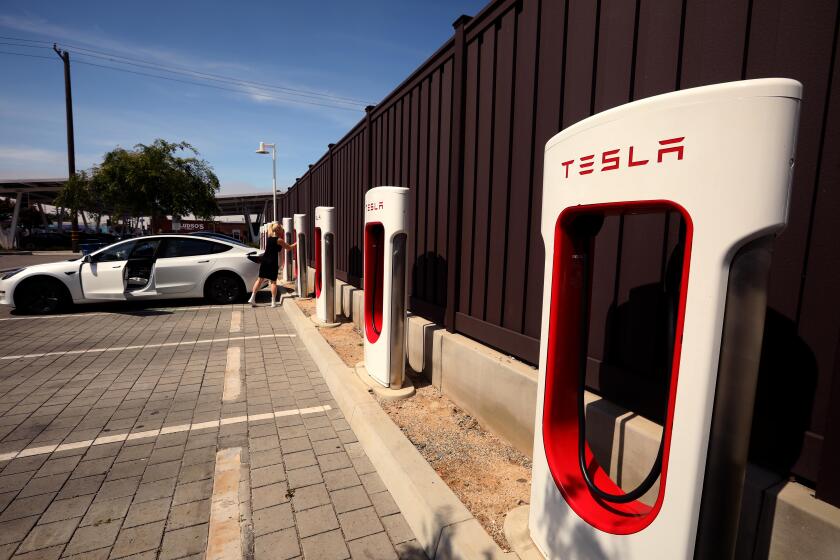Patent War Over Auto Dash Shades Heating Up
Ever since 1980, when Abraham Levy got the last of his four patents for designing those folding cardboard shades now on the dashboards of millions of cars, Levy has been busy suing alleged patent infringers for selling the shades without his approval.
His latest legal effort came last week, when Levy sued L & M Enterprises, a wholesaler in Phoenix, Ariz., that he alleged is selling unauthorized copies of his design. L & M denied the charge.
In a statement announcing the suit, Levy, a Westlake Village resident, noted that he already has won nearly two dozen such cases, which force the makers and sellers of the copy-cat shades to pay him licensing royalties.
But Levy, 59, also is fighting a battle on his rear flank. A Carson manufacturer, Empire Container Corp., is challenging the validity of Levy’s patents, and a jury trial in the case is scheduled for March 1.
A lot of money is at stake. Levy estimates that more than 25 million shades have been sold nationwide since they became popular two years ago. Although he declined comment on his income, it’s probable that the business has made him a millionaire, because a typical royalty is 10 or 15 cents a shade.
If his patents were declared invalid, however, it might allow producers and retailers of the shades to stop paying Levy licensing fees, which would cost him at least hundreds of thousands of dollars.
Sales of the shades remain brisk, and corporations use them as a popular media for advertising.
Advertising Gimmicks
In 1986, Empire had been manufacturing the accordion-like shades for about a year when Levy sued the company in U. S. District Court in Los Angeles, alleging that Empire was infringing on his patents and using stolen trade secrets.
Empire denied the charge and sought to invalidate Levy’s patents on grounds that, among other things, his invention was not novel.
“There already were other devices that consisted of a piece of cardboard that you put on the inside of a window of a car to keep the sun out,” said Lewis Anten, a lawyer in Encino representing Empire. “And there were other accordion- or fan-folded pieces of cardboard before Mr. Levy claims to have made his invention (in the early 1970s).”
Levy declined comment on the litigation and referred inquiries to his lawyer, Joseph H. Golant in Los Angeles, who said there have been “other people who tried to solve the problem (of hot dashboards) but not as successfully as Levy, who came up with something relatively simple, relatively cheap and also novel. It hasn’t been done before.”
Pending the outcome of the trial, U.S. District Judge Dickran Tevrizian in Los Angeles last October issued a preliminary injunction that blocks Empire from making any more of the shades.
Empire is not the first company to challenge Levy’s patents, but the other challengers settled with Levy out of court.
The most notable case involved Auto-Shade, a company run by Van Nuys entrepreneurs Avi Fattal and Avi Ruimi that is now among the biggest of the car-shade distributors. Auto-Shade at first tried to have the patents invalidated after Levy sued the company for patent infringement. But Auto-Shade settled in May 1986 and now pays undisclosed royalties to the inventor.
Levy, meanwhile, said in his press release that L & M Enterprises in Phoenix, run by entrepreneur Lynda Goldman, is to appear before a federal judge Aug. 31 to face possible contempt-of-court charges.
Consent Judgment Issued
In January, a federal judge issued a consent judgment against L & M forbidding it to make or sell the shades without Levy’s approval. Levy asserts that no such approval has been given and yet L & M has continued making the products, and now he wants the company found in contempt of court for violating the consent judgment.
But L & M’s lawyer, David Beychok in Newport Beach, contends that last September Levy’s company, Car Cool, sent Goldman a form letter that she signed, thus setting up a license agreement.
“We are not in contempt of court because we have a licensing agreement with Car Cool to produce sun shields,” Beychok said.
He said that when Goldman signed the form letter, she agreed to pay Levy back royalties for shades she already had sold. “It was in excess of $5,000. We paid that, and they accepted our check,” Beychok said. Goldman also agreed to pay a 15-cent royalty to Levy for each shade sold thereafter, he said.
Goldman has yet to pay the additional royalties because she first wanted to negotiate a licensing agreement with Levy that contained all the terms of their relationship, Beychok said. She has, however, kept the royalties in a reserve, he said.
Golant, Levy’s attorney, declined to discuss the specifics of the case, except to say Goldman “is simply not licensed” to keep making the shades because no oral or written licensing agreement was ever reached.




